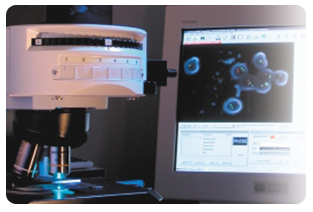
Aneuploidy is a term used to describe a chromosome problem, that is caused by an extra or missing chromosome. If an error occurs leading to the egg or sperm having an extra or missing chromosome, the embryo created by that egg or sperm would have an extra or missing chromosome. This situation is called aneuploidy. Having an extra chromosome is known as trisomy (tri = three of the chromosome) and having a chromosome missing is known as monosomy (mono = one of the chromosome).
The most common chromosome abnormalities in miscarriages include: trisomy (3 copies of a chromosome) or monosomy (one copy of a chromosome) for chromosomes 13, 15, 16, 18, 21, or 22; triploidy (3 copies of all the chromosomes); and abnormalities of the sex chromosomes.
The most common example of a chromosomal aneuploidy is Down syndrome, or trisomy 21. Other common chromosomal aneuploidies are trisomy 13, trisomy 18, Turner syndrome and Klinefelter syndrome, which can result in liveborn children with a range of birth defects and cognitive disability.
• Down syndrome is caused by an extra copy of chromosome 21 and is also known as trisomy 21. Down syndrome is associated with mental retardation and other birth defects, such as heart problems.
• Turner syndrome is caused by the absence of one sex chromosome, also known as 45,XO. Approximately 99% of pregnancies affected with Turner syndrome are miscarried.
• Trisomy 18 is due to the presence of an extra copy of chromosome 18 in the baby’s cells. The risk for miscarriage in the pregnancy is increased. Babies born with trisomy 18 have severe mental retardation and other birth defects. The majority of babies do not survive beyond the first few months of life.
• Trisomy 13 is due to the presence of an extra copy of chromosome 13 in the baby’s cells. This condition is similar to trisomy 18 in its severity and outcome.
We also test for chromosomes 8, 9, 15, 16, 17, and 22. Aneuploidy conditions involving these chromosomes can cause lack of implantation or can results in a miscarriage early in pregnancy.

It is known that approximately 3 out of 4 (75%) embryos created by IVF will not be capable of producing a live born child. Some will fail to implant in the uterus, while others will implant but be unable to carry out early embryonic development. Finally, as in natural pregnancy, approximately 15%-20% of conceptions will be lost as a clinical miscarriage. While there are many reasons for the failure of an embryo to make a baby, the single most important factor is an abnormality of the chromosomes.
Similarly, for most couples, a significant number of the embryos created by IVF will have chromosome abnormalities. The exact percentage of chromosomally abnormal embryos that each couple produces is related to many factors including maternal age, number of failed IVF cycles, and the type of sperm used. In addition, a certain percentage of abnormalities are due to the fact that IVF is not a natural process, and hyperstimulation of the ovaries produces an increased percentage of chromosomally abnormal eggs.